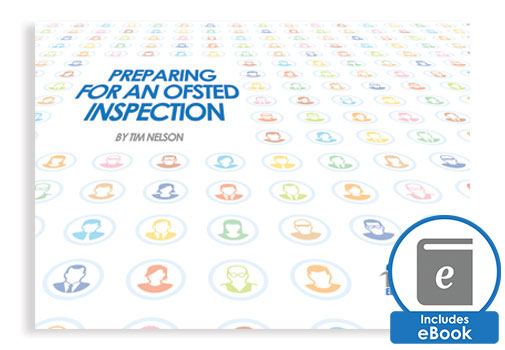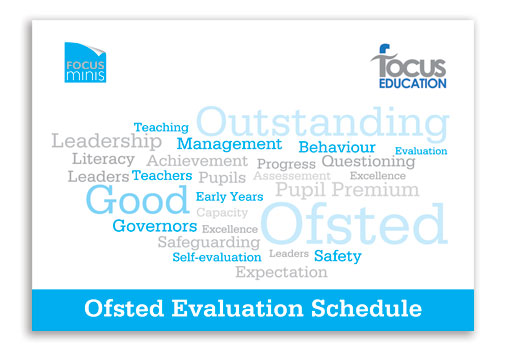
Last week I finally got round to decluttering my computer files. I am ashamed to say that some of them date back to 2008! So it was quite a big job and one that was well overdue. Most of the deleting was straightforward. ‘Stuff’ simply had to go as it would never be required again. Then I came to my list of files that all began: Changes to OfSTED since………. I was immediately drawn to the sheer volume of Ofsted changes schools have had to deal with since I began keeping such files back in 2008. A change to the Ofsted Framework documentation and or the Evaluation Schedule, whether it was minor or major, had taken place each term from 2008 when I began my filing system until the present day!
Changes to section 5 and section 8
These changes happened as a result of a shift in government policy or from the feedback schools and inspectors provided to HMI. I then looked in more detail at the adjustments Ofsted have made to the inspections from the start of this new academic year. There are two strands to consider. Firstly the documentation related to both section 5 and section 8 inspections.
The major changes to section 5 inspections are:
- Guidance on monitoring inspections of grade 4 schools to take into account the recent legislative changes and the government’s new Schools Causing Concern guidance.
- Clarified details about who inspectors need to meet with to inspect governance at the school.
- Under ‘effectiveness of leadership and management’, reference to inspectors having consideration for governors’ development in their role as part of the effectiveness of school leadership.
- In the ‘outcomes’ section, amended grade descriptors to reflect changes to national assessment and accountability measures.
- Linked to this, in the ‘outcomes’ section, we revised the guidance about inspecting the performance of disadvantaged pupils to take account of the new -measures relating to pupil progress , including comparing the progress made nationally with other pupils with the same starting points.
The main changes to the section 8 inspection are:
- Clarification about inspecting governance and who inspectors should meet with updated in the section 5 handbook is also reflected in the updated section 8 handbook.
- A minor change had been made to reflect the fact that Ofsted Inspectors (as distinct from Her Majesty’s Inspectors) may now be asked on occasion to lead section 8 ‘no formal designation’ inspections.
- Under ‘short inspections’, a reference to the online surveys to gather staff and pupil views.
- A revision to the section on Requires Improvement monitoring to reflect the government’s White Paper proposal on improvement periods for schools with new headteachers.
- A detailed update to the guidance on monitoring of Schools Causing Concern in the light of recent legislative changes (Education and Adoption Act 2016) and the revised Schools Causing Concern statutory guidance. This includes requirements relating to statements of action for schools in categories of concern.
Beneath the above changes lie those that are more subtle and refer to the trail of questioning HMI and OfSTED may pursue. These questions for school leaders should be contextual, planned for and bespoke to the issues arising in the school. They should be informed by data analysis and as a result of evaluating other information including policies, documentation, discussions with staff, pupils, parents, governors as well as visits to classrooms and work scrutiny.
Some examples of questions to leaders that may be adapted to the school’s context could be:
- What approaches did you find successful in improving progress in **? Which improved more, lower or higher prior attainers? How have you adapted approaches for this year and for other subjects?
- What specific needs of ** group did you aim to address?
- What approaches have you adopted for this year? Why?
- How are the most able disadvantaged progressing in relation to other pupils in school and other pupils nationally from the same starting points?
- How do you identify the needs of disadvantaged children and the most able children from the early years?
- What approaches do you use to improve reading and what is the evidence of impact of each approach?
- Discuss with me the school’s pupil premium strategy in relation to your subject.
Reading and phonic specific
- Look at the 10 disadvantaged children in the EY in 2013 talk me through the attainment of these children in meeting the Year 1 phonics standard and their achievement in reading at the end of KS1. What are the reasons for this? Were the most able in that EY group who had potential to attain a higher standard able to do this?
- What will I see in lessons in Rec, Year 1 & Year 2 enabling disadvantaged pupils to attain more highly in reading (both most able disadvantaged and other disadvantaged) What do your records show?
- How have approaches funded through pupil premium targeted and supported reading? How have you been involved in developing approaches to evaluate the impact of these? What do you think would help the range of disadvantaged pupils to improve in reading?
Questions that could be asked of a headteacher that are directly related to teaching may be similar to the following:
- What are you doing to address areas of underperformance and what has been the impact of what you have done?
- What is the nature of your CPD programme and on what basis has it been arrived at?
- What has been the impact of your CPD programme?
- What professional development opportunities do you provide for teachers in the early stages of their careers?
- What use do you make of external support and what has been its impact?
- What use do you make of internal expertise and what has been its impact?
- What opportunities do teachers have to learn from each other?
- How do you tackle teacher underperformance and what evidence is there of impact?
- How is performance management improving the quality of teaching?
- How is good and outstanding practice shared across the school?
- To what extent are teachers learning from each other?
- What account are you taking of the Teachers’ Standards and what has been the impact of this in terms of appraisal procedures and your CPD programme?
- What is the contribution of teachers on UPS3 to the wider life of the school and to the raising of standards?
- What do you do to recruit, develop and retain teachers at your school?
- What are you doing to ensure that teaching in English and mathematics bring about good progress?
- What proportion of staff have passed through to the upper pay spine and how are teachers on the upper pay spine helping to improve standards and the quality of teaching at the school?
Leadership remains at the heart of inspection.
Leadership remains at the heart of inspection. From good or better leadership comes consistently good teaching and outcomes for pupils. Leaders need to ‘talk the talk’ and ‘walk the walk’. In other words if a mathematics leader says that the teaching of mathematics has improved over the last two years then the evidence to back this statement up must be robust and triangulated. Leaders need to be able to talk confidently about their impact on outcomes and not just what they have done.
Undoubtedly there will be more changes to OfSTED inspections in the future and I will continue to make new OfSTED files. I can only hope the changes are minor and fewer so that a greater semblance of stability returns to the fast moving world of education we are all part of.
Continue the Conversation
If you still have questions about the changes to Ofsted, join me on twitter @FocusKAD or for resources and publications get in touch with the Focus Education office on 01457 821 818.
Related Publications
Keith has served as associate headteacher in schools with vulnerable and challenging circumstances, headteacher in three schools, before becoming a Local Authority officer. He has established headteacher mentoring schemes and lead national improvement programmes across the Learning Authority.









